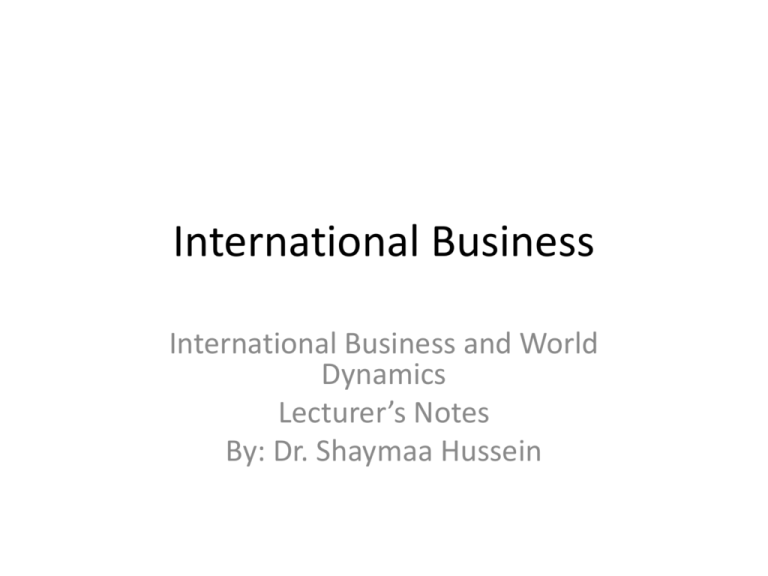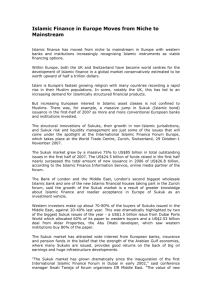International Business
advertisement

International Business International Business and World Dynamics Lecturer’s Notes By: Dr. Shaymaa Hussein Topics to be Covered Impact of Multinationals Slides 3 – 16 International Business Diplomacy Slides 17 – 22 Muslims Countries, North-South and East-West Business Slides 23- 35 Implications of International Relations towards International Business Slides 36- 41 Impact of Multinationals • Multinational enterprises (MNEs) have their greatest impact on countries when they engage in foreign direct investment (FDI) via whollyowned subsidiaries and/or joint ventures. • Although not all MNEs are huge, the sheer size of many troubles their critics. • The global orientation of MNEs causes many to believe that they are insensitive to national (local) concerns. Impact of Multinationals Trade-offs among Constituencies Stakeholders, i.e., the collection of constituencies that an organization must satisfy to survive in the long run, include: – shareholders – employees – customers – suppliers – society In the long run, the aims of all stakeholders must be adequately met or none will be attained. Impact of Multinationals • Advocates of corporate social responsibility (CSR) believe that capitalism fails to serve the public interest and that managers must be pressured to act responsibly. • Others argue that: – managers are best equipped to serve the interests of their shareholders and – governments should deal with social issues and externalities whenever private sector benefits and costs differ significantly from public sector benefits and costs Impact of Multinationals Balance-of-Payments Effects of FDI: A country must compensate for a long-term trade deficit by: • reducing its capital reserves • attracting an influx of capital via the receipt of foreign direct investment • the purchase of public or private debt by foreign governments or individuals • the receipt of unilateral transfers (e.g., foreign aid) Ultimately, one country’s deficit is another country’s surplus. Impact of Multinationals Calculating the Balance-of-Payments Effects : B = (m –m1) + (x – x1) + (c – c1) where B = balance-of-payments effect m = import displacement m1 = import stimulus x = export stimulus x1 = export reduction c = capital inflow for other than import and export payments c1 = capital outflow for other than import and export payments Impact of Multinationals Host Country BOP Effects: • The net import effect (m – m1) is positive if the FDI results in the substitution of local production for imported products and is negative if it results in an increase in imports. • The marginal propensity to import represents the fraction of an increase in imports that are due to an increase in income. • The net export effect (x – x1) is positive if the FDI results in the generation of exports but negative if it results in a decline. • FDI may also stimulate home country exports of complementary products to the host country. Impact of Multinationals • Net capital flows (c – c1) are difficult to assess because of the time lag between the outward flow of investment funds and the subsequent inward flow of remitted earnings from that investment. Although initial capital flows to the host country are positive, they may be negative in the long run if capital outflows eventually exceed the value of the investment. Impact of Multinationals Selected Economic Growth and Employment Effects of FDI: • Home Country Losses—FDI outflows may create jobs abroad at the expense of jobs in the home country. • Host Country Gains—FDI inflows may result in the transfer of capital, technology, and/or managerial expertise, and well as the creation of new jobs. • Host Country Losses—FDI inflows may: cream off premium resources drive up local labor costs displace domestic investment disadvantage local competitors destroy local entrepreneurship Impact of Multinationals Cultural Foundations of Ethical Corporate Behavior: • Cultural relativism holds that ethical truths depend upon the groups subscribing to them; thus, intervention in local issues and traditions by outsiders is clearly unethical. • Cultural normativism holds that there are universal standards of behavior that everyone should follow; thus, non-intervention in local violations of global standards is clearly unethical. While many actions elicit universal agreement on what is clearly right and wrong, others are less clear. Impact of Multinationals Legal Foundations of Ethical Corporate Behavior: • Ethics teaches that people have a responsibility to do what is right and to avoid doing what is wrong. • The appropriateness of behavior can be measured in the sense that individuals and organizations must seek justification for their behavior, and that justification is a function of both cultural values and legal principles. • Civil law countries tend to have a large body of law dealing with business operations; common law countries rely more on precedent than statutory regulations. Impact of Multinationals • Extraterritoriality: the extension by a government of the application of its laws to the foreign operations of its domestic firms In cases of health and safety standards, differences may not be insurmountable, but in other instances differences in home- and host-country laws may pose challenging conflicts. • Externalities: the by-products of activities that affect the well-being of people and/or the environment Although externalities are not reflected in standard cost accounting practices, they must be include in the determination of stakeholder value Impact of Multinationals Ethical Behavior and Environmental Issues: • Sustainability: meeting the needs of the present without compromising the ability of future generations to meet their own needs, while taking into account what is best for people and for the environment The Kyoto Protocol: signed in 1997, the Protocol is an extension of the UN Framework Convention on Climate Change that obligates signatory countries to reduce their greenhouse gas emissions to 5.2 percent below 1990 levels between 2008 and 2012 Global warming results from the release of greenhouse gases that trap heat in the atmosphere, rather than allowing the heat to escape. Impact of Multinationals Ethical Dilemmas and Pharmaceutical Sales: • Research-based pharmaceutical firms sell products at high prices so long as their products are covered by patents. Legal generic products comply with patents while allowing for the purchase of drugs at lower costs; unauthorized (illegal) generic products may or may not be reliable. The WTO Agreement on Trade-Related Aspects of Intellectual Property (TRIPs) provides a mechanism for poor countries facing health crises to either produce or import generic products. Governments and private foundations enable countries to issue bonds to generate funds needed to purchase vaccines via the International Finance Facility for Immunization. Impact of Multinationals Child Labor Issues: According to the International Labor Organization: • more than 250 million children between 5 and 17 are working worldwide • nearly three-quarters of those children who work are very young or are working in ways that endanger their health or well-being because of hazards, sexual exploitation, trafficking, and/or debt bondage Those who argue in favor of child labor claim that in many instances, children are better suited to perform certain tasks than adults, and that if the children were not employed, they would in fact be worse off. While some firms simply avoid operating in countries where child labor is used, other firms work to establish responsible operating policies in those locales. International Business Diplomacy The Pervasive Impact of Culture on Negotiation Behavior • Companies and countries do not negotiate—people do • Cultural differences in negotiation styles can cause problems in international at the levels of: Language Nonverbal behaviors Values Thinking and decision-making processes International Business Diplomacy • Four steps lead to more efficient and effective international business negotiations, which include: 1. selection of the appropriate negotiation team 2. management of preliminaries, including training, preparations, and manipulation of negotiation settings 3. management of the process of negotiations, that is, what happens at the negotiation table 4. appropriate follow-up procedures and practices International Business Diplomacy • Many companies provide employees with negotiations training on: Language skills Social and diplomatic skills Knowledge specific to the diplomatic profession Including diplomatic history and international relations Law Economic Politics International organizations Foreign policies International Business Diplomacy • The following checklist ensures proper preparation and planning for international negotiations: Assessment of the situation and the people Facts to confirm during the negotiation Agenda Best alternative to a negotiated agreement Concession strategies Team assignments International Business Diplomacy • There are at least seven aspects of the negotiation setting that should be manipulated ahead of time if possible: Location Physical arrangements Number of parties Number of participants Audiences (news media, competitors, fellow vendors, etc.) Communications channels Time limits International Business Diplomacy • Differences in the expectations held by parties from different cultures are one of the major difficulties in any international business negotiation • Everywhere around the world we have found that business negotiations proceed through four stages: Non-task sounding Task-related exchange of information Persuasion Concessions and agreement Muslims Countries, North-South and East-West Business Religion • Religion, the shared set of beliefs, activities, and institutions based on faith in supernatural forces, remains a critical force in most countries • Most countries are now seeing a strong growth in popularity of religions • Furthermore, even countries such as Russia and China, where religion was until recently banned, are now seeing dramatic increases in the popularity of religions Muslims Countries, North-South and East-West Business How does religion impact international business? • At a fundamental level, religions provide guidance regarding what is the appropriate way to deal with societal expectations • Religions provide individuals with a set of principles to live by • However, through its effects on people, religion also affects both multinational companies and their operations through its influence on business procedures Muslims Countries, North-South and East-West Business Islam • The essence of Islam as described in the Qur’an is the submission to the will of Allah (The only God) • Islam is currently the second largest of the world’s religions and has adherents in countries in Africa, the Middle East, China, Malaysia, and the Far East • It continues to grow rapidly in many countries, especially in Europe Muslims Countries, North-South and East-West Business • An important aspect of living in an Islamic society is the presence of Islamic law Islamic law is based on the Qur’an, Islam’s holy book The Qur’an expresses the Islamic work ethic and the rules that should guide Muslims as they encounter situations in their daily lives Muslims Countries, North-South and East-West Business • Islam has implications for multinational companies on many levels The riba strictly forbids receiving or giving interest Such practices of forbidding interest are not just ideals but are actually respected in many countries, including Pakistan In such countries, governments have instituted financial laws that see interest as illegal Muslims Countries, North-South and East-West Business • In general, the Qur’an is supportive of entrepreneurship and earning of profits through legitimate business activities • The Qur’an also allows accumulation and protection of private property • However, Muslims are naturally concerned with issues of social justice and fairness • As such, Muslims are likely to condemn the pursuit of profits through the exploitation of others • Multinationals thus have to ensure that their business activities are conducted in a socially just manner Muslims Countries, North-South and East-West Business • Illustration on Sukuk Structuring Literal Meaning Sukuk is the plural of sak which means certificates. Other similar terms: Taskik – process of dividing assets into papers (sukuk) Tawriq – to render something into cash Technical Meaning Sukuk refers to securities, notes, papers or certificates, with features of liquidity and tradability (except for salam and murabahah sukuk) Muslims Countries, North-South and East-West Business • Investment sukuk are certificates of equal value representing undivided shares in ownership of tangible assets, usufructs and services (in the ownership of) the assets of particular projects or special investment activity” • Malaysian Securities Commission: A document or certificate which represents the value of an asset” • Asset – may include financial asset such as receivables and debts, as well as non financial assets like tangible assets, usufructs and services. Muslims Countries, North-South and East-West Business Emerging interest on Islamic finance as viable alternative to the global financial system … • Starting in 1971 with the first Islamic bank in Egypt, there are now more than 600 Islamic financial institutions in 75 countries. • UK Gov’t sets an objective to ‘entrench London as a global gateway for Islamic finance 5 FSA-approved Islamic banks and Takaful operators Plans to issue sovereign sukuk, amend tax law on IF Muslims Countries, North-South and East-West Business • France Passed rules/regulations to support Islamic finance activities In process of licensing Islamic banks Made fiscal & legal adjustment for IF transaction i.e. taxation guidelines on sukuk & murabaha. • Germany Saxony-Anhalt state issued government sukuk First Islamic bank to operate in 2010 Muslims Countries, North-South and East-West Business • Malta Plans to position as Islamic finance hub for the Mediterranean. • Jordan Plans to tap sukuk market to finance its deficit. • Turkey Announced IFC Istanbul in Sep ’09 with focus includes interest-free financial business Muslims Countries, North-South and East-West Business • South Korea Parliament expected to pass the law related to offering of tax waiver on foreign investors’ interest income from sukuk issued • Japan Law passed allowing banks to do Islamic finance. • Hong Kong Aims to become Islamic finance gateway to China Plans to issue sovereign sukuk Hang Seng Islamic China Index Fund in 2007 Muslims Countries, North-South and East-West Business • Singapore Established first Islamic bank Introduced tax neutrality for Islamic finance Aspiring to be center for Islamic finance • Brunei Aim to become Islamic financial services hub for Asia Implications of International Relations towards International Business • Over the last two decades there has been a dramatic change in the political systems of many countries. • In particular, there has been a move towards marketdriven economies in Eastern Europe and China. • Economic systems Market-driven economy Centrally determined economy Mixed economies Implications of International Relations towards International Business • Government control of assets: • Privatization: The process of selling government assets to private buyers. Divestiture: A process by which a government or business sells assets. Contract Management: A process by which an organization (such as the government) transfers operating responsibility of an industry without transferring the legal title and ownership. • Nationalization: A process by which the government takes control of business assets, with or without remuneration of the owner. Implications of International Relations towards International Business • Although governments are privatizing assets, this does not mean that they are not involved in business. • Business-government cooperation continues to be beneficial, particularly in the EU and Japan. Economic integration: • The establishment of transnational rules and regulations that enhance economic trade and cooperation among countries. Implications of International Relations towards International Business Trade creation and diversion: • Trade creation: A process in which members of an economic integration group begin to focus their efforts on those goods and services for which they have a comparative advantage and start trading more extensively with each other. • Trade diversion: A process in which members of an economic integration group decreases trade with nonmember countries in favor of trade with each other. Implications of International Relations towards International Business • A strategic alliance: is a business relationship in which two or more companies work together to achieve a collective advantage. • These alliances can take a number of forms: research cooperation; marketing cooperation; licensing of a product or technology for a specific market region. Implications of International Relations towards International Business • Localization of business operations: • MNEs must adapt their offering, their expectations and the way in which they do business to each market in which they operate. • These efforts result in the localization of business operations and typically focus on four areas: Products Profits Production Management.









